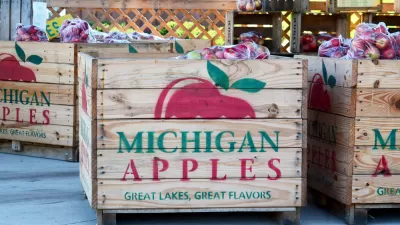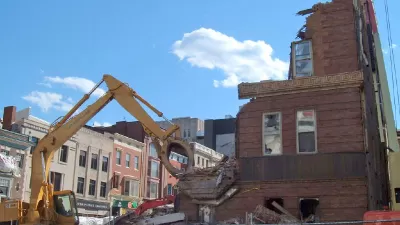I don’t know what it is about New Orleans that makes me wax rhapsodic. But something about the city makes everyday life look poetic. I returned to the Crescent City last week after having last visited just seven months ago, when a tree planting
I don't know what it is about New Orleans that makes me wax rhapsodic. But something about the city makes everyday life look poetic.
I returned to the Crescent City last week after having last visited just seven months ago, when a tree planting I participated in was marred by the tragic shooting of a 21-year-old just around the corner in a neighborhood known as Pigeon Town. I knew I had to go back.
At the time, I predictably waxed rhapsodic about the horrible incident, and tried to reconcile the tragedy with the research and literature suggesting the trees we planted will make the neighborhood safer. And to assuage just a teensy bit of my bougie planner guilt, I pledged to return to visit the last tree that we didn't have time to get in the ground before the shots rang out.
I didn't expect that I'd get to return so soon, but the Big Easy is magnetic like that.
This late-scheduled trip was for the Center for Community Progress' "Reclaiming Vacant Properties" conference, three days of reimagining the acres of abandoned land blanketing America's "legacy cities." (We spent a long while discussing how to define a "legacy city"-one of those wonderful urban planning euphemisms. Hint: If you live in a city that isn't New York, it's probably a legacy city.)
We discussed land banking and economic development, urban agriculture and stormwater management, and then a lot more land banking-seemingly urban planners' vacant land panacea du jour.
Not surprisingly, the conference drew a lot of Detroiters. Apparently the Motor City has a bit of vacant blight to deal with.
I mean the following statement in the most affectionate way possible: If you ever want to feel better about your city, spend an afternoon with someone from Detroit.
I was already pretty impressed with the way that Philly is handling its 40,000 vacant lots. (And I'm damn proud that my employer, the Pennsylvania Horticultural Society, has a lot-no pun intended-to do with that.)
(I'm less proud about that pun.)
My home town has recently created a way to tame the beast of multiple-city-agency ownership by establishing a "front door" that actually, for once, improves the experience of anyone wishing to be a customer of the City of Philadelphia. Revolutionary. And talking at length with a few planners and landscape architects from Detroit-where they're inclined to throw their hands up in surrender to the problem-I realized that Philly's solution starts to look downright elegant.
But that satisfaction can be short-lived. So I swept up a new Detroit landscape architect friend and embarked on my most serious mission for the trip: a return to Pigeon Town.
We walked around the neighborhood a bit before finding the spot, and were floored by how jungle-like much of this still very residential neighborhood was. I'd read about the Lower Ninth Ward being reclaimed by nature, but even in pretty highly elevated Pigeon Town, weeds grew the size of giant palm fronds, and in one house, two pigeons kept watch out of a blown-out window frame (just in case you weren't sure whose neighborhood this was).
We finally came upon the block where we'd planted the trees last year. I immediately saw that the trees looked healthy. They were clearly cared for, and the blocks-including the one where 21-year-old Ray Anthony Maxwell was gunned down on the 30th of November-looked better because of them.
We continued to the end of the block, where I found the tree I'd personally helped plant. It was in the yard of a white house, which I thought at the time was abandoned. Fortunately, I was quite wrong: As we approached, I saw two women sitting and talking on the front porch, as a couple of young children ran around the yard playing. The hose was actively filling up the gator bag, which will slowly water the tree and keep it healthy. The tree was filled with flowers, blooming brighter than any other one on the block.
If a scene like that ain't rhapsody, I don't know what is.

Planetizen Federal Action Tracker
A weekly monitor of how Trump’s orders and actions are impacting planners and planning in America.

Restaurant Patios Were a Pandemic Win — Why Were They so Hard to Keep?
Social distancing requirements and changes in travel patterns prompted cities to pilot new uses for street and sidewalk space. Then it got complicated.

Map: Where Senate Republicans Want to Sell Your Public Lands
For public land advocates, the Senate Republicans’ proposal to sell millions of acres of public land in the West is “the biggest fight of their careers.”

Maui's Vacation Rental Debate Turns Ugly
Verbal attacks, misinformation campaigns and fistfights plague a high-stakes debate to convert thousands of vacation rentals into long-term housing.

San Francisco Suspends Traffic Calming Amidst Record Deaths
Citing “a challenging fiscal landscape,” the city will cease the program on the heels of 42 traffic deaths, including 24 pedestrians.

California Homeless Arrests, Citations Spike After Ruling
An investigation reveals that anti-homeless actions increased up to 500% after Grants Pass v. Johnson — even in cities claiming no policy change.
Urban Design for Planners 1: Software Tools
This six-course series explores essential urban design concepts using open source software and equips planners with the tools they need to participate fully in the urban design process.
Planning for Universal Design
Learn the tools for implementing Universal Design in planning regulations.
Heyer Gruel & Associates PA
JM Goldson LLC
Custer County Colorado
City of Camden Redevelopment Agency
City of Astoria
Transportation Research & Education Center (TREC) at Portland State University
Camden Redevelopment Agency
City of Claremont
Municipality of Princeton (NJ)






























